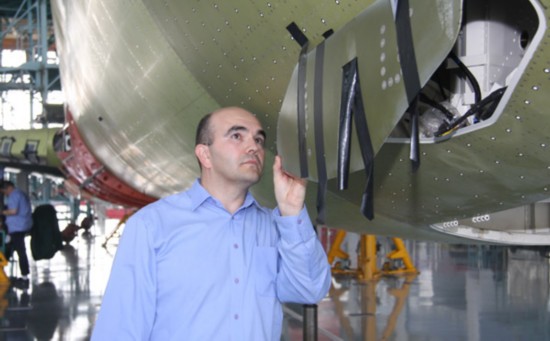


Cyrille Breard, an engineer at the Commercial Aircraft Corporation of China who manages the noise and emission project of C919, China's domestically-made passenger plane, checks the components of a plane in production. Wang Jiliang / For China Daily
Like all his colleagues at the Commercial Aircraft Corporation of China (COMAC), Cyrille Breard, the manager of the C919 program's noise and emissions project, is working against the clock as China's domestically-made passenger plane is undergoing a series of tests before acquiring its airworthiness certificates.
The large aircraft "has been a big dream", said the 48-year-old engineer from the United States, who joined COMAC in 2011. "Now it's a dream coming true."
After making its maiden flight in May, the C919 jetliner flew more than 1,300 kilometers to the Yanliang testing base in Xi'an, Shaanxi province, on Nov 10 for more tests.
As a national project, the C919 shoulders China's long-cherished ambition to regain its past glory through its manufacturing prowess and advanced technology.
Comparable to the updated Airbus 320 and Boeing's new-generation 737, the C919 has adopted a combination state-of-the-art design, engine, entertainment and technology.
According to Breard, the C919 will have to go through more difficult and stricter tests than Boeing or Airbus did decades ago to obtain the latest certification requirements, but the process will also make the aircraft better.
The responsibility of Breard and his team is to lower noise uncertainty of the new jetliner, which will not only guarantee a safe and environmentally friendly flight, but also provide passengers a quieter journey. Too much noise will also shorten an aircraft's service life, he said.
Breard said that many international airports have strict restrictions on aircraft noise during taking off and landing, and if the C919 cannot meet these standards, it will be impossible for COMAC to sell planes to carriers that fly to these airports.
"The noise is relevant to many factors, including structure, weight and decoration," said Breard, who had worked as an acoustics scientist for product development and technology at Boeing before he joined COMAC.
Breard said he and his team aim not only to meet current noise standards, but have also taken into consideration factors that are expected to be included in future regulations to ensure the C919 has "a competitive advantage".
Breard, who has a Chinese wife, said he wanted to go to China as early as 2000 when he was studying at Imperial College Rolls-Royce Vibration University Technology Center in London.
Learning that China had set up a company to develop its own commercial aircraft, Breard joined COMAC upon completion of his MBA degree in technology management from the University of Washington in Seattle in 2011.
"To work at a big company like COMAC is a huge opportunity," he said. "It is a huge project."
So far, COMAC has received 730 orders from 27 Chinese and overseas companies, and the company looks set to have 750 orders for the C919 by the end of this year, Xu Pei, deputy chief of the marketing division of COMAC, said in September.
"You have a large-scale national program. I don't know how often that happens in your life," said Breard. "It was like Boeing 50 years ago or Airbus 40 years ago. When they are created, you want to be part of it."
In recognition of his contribution, on Dec 5, 2012, Breard was among 20 foreign experts from 16 countries invited by Xi Jinping - who was vice-president at the time - for a face-to-face meeting at the Great Hall of the People in Beijing.
At the meeting, the first of its kind presided over by Xi in his role as general secretary of the Central Committee of the Communist Party of China, Xi noted that China should take a more active, open, and effective approach to attract talent, so that skilled foreign workers would like to come, stay and work in China.
 Fire brigade in Shanghai holds group wedding
Fire brigade in Shanghai holds group wedding Tourists enjoy ice sculptures in Datan Town, north China
Tourists enjoy ice sculptures in Datan Town, north China Sunset scenery of Dayan Pagoda in Xi'an
Sunset scenery of Dayan Pagoda in Xi'an Tourists have fun at scenic spot in Nanlong Town, NW China
Tourists have fun at scenic spot in Nanlong Town, NW China Harbin attracts tourists by making best use of ice in winter
Harbin attracts tourists by making best use of ice in winter In pics: FIS Alpine Ski Women's World Cup Slalom
In pics: FIS Alpine Ski Women's World Cup Slalom Black-necked cranes rest at reservoir in Lhunzhub County, Lhasa
Black-necked cranes rest at reservoir in Lhunzhub County, Lhasa China's FAST telescope will be available to foreign scientists in April
China's FAST telescope will be available to foreign scientists in April "She power" plays indispensable role in poverty alleviation
"She power" plays indispensable role in poverty alleviation Top 10 world news events of People's Daily in 2020
Top 10 world news events of People's Daily in 2020 Top 10 China news events of People's Daily in 2020
Top 10 China news events of People's Daily in 2020 Top 10 media buzzwords of 2020
Top 10 media buzzwords of 2020 Year-ender:10 major tourism stories of 2020
Year-ender:10 major tourism stories of 2020 No interference in Venezuelan issues
No interference in Venezuelan issues
 Biz prepares for trade spat
Biz prepares for trade spat
 Broadcasting Continent
Broadcasting Continent Australia wins Chinese CEOs as US loses
Australia wins Chinese CEOs as US loses